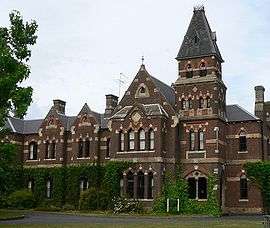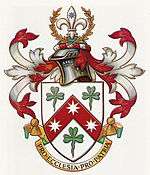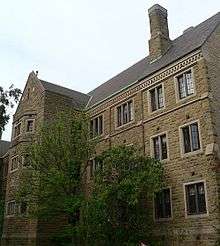Trinity College, Melbourne
Trinity College is the oldest residential college of the University of Melbourne[1] in Australia. The college was founded in 1872 on a site granted to the Church of England by the university. In addition to its resident community of 380 University of Melbourne and University of Divinity students, Trinity's programs includes Trinity College Foundation Studies, which prepares around 1500 international students for admission to the University of Melbourne annually; the Trinity College Theological School, an Anglican theological college, now a college of the University of Divinity; and the Pathways School, which runs the Foundation Studies program, summer and winter schools for young leaders, as well as other shorter learning and leadership programs.
| Trinity College | |||||||||||
|---|---|---|---|---|---|---|---|---|---|---|---|
| University of Melbourne | |||||||||||
 | |||||||||||
 Arms of Trinity College | |||||||||||
| Location | Royal Parade, Parkville, Victoria | ||||||||||
| Coordinates | 37.7948°S 144.9589°E | ||||||||||
| Full name | Trinity College of and within the University of Melbourne | ||||||||||
| Motto | Pro Ecclesia, Pro Patria (Latin) | ||||||||||
| Motto in English | For church, for country | ||||||||||
| Established | 1872 | ||||||||||
| Named for | The Holy Trinity | ||||||||||
| Warden | Kenneth Hinchcliff | ||||||||||
| Undergraduates | 252 | ||||||||||
| Postgraduates | 47 | ||||||||||
| Website | trinity.unimelb.edu.au | ||||||||||
.jpg)

History
Trinity College was founded in 1872 by the first Anglican Bishop of Melbourne, Charles Perry. The college was affiliated with the University of Melbourne in 1876. The Trinity College Theological School was founded by Bishop James Moorhouse in 1877.[2]
In 1883 the college became the first university college in Australia to admit women when Lilian Helen Alexander was accepted as a non-resident student.[3] With the establishment of the Trinity Women's Hostel (which later became Janet Clarke Hall) in 1886, Trinity admitted women as resident students, making it the first university college in Australia to do so.
In 1989 the Trinity College Foundation Studies program was established to prepare international students for entry to the University of Melbourne.
Since 2001, Trinity has also offered summer school programs to high school age students from around Australia and internationally. In 2010 the college hosted its first Juilliard Winter Jazz School, which was repeated in 2011.
Architecture and main buildings
Situated to the north of the main university campus, Trinity's various ivy-clad stone and brick buildings surround a large grassed area, known as the Bulpadock.
The college's main buildings include:
- 1870-2: Leeper Building (formerly the Provost's Lodge)
- 1878: Bishops' Building (named after Charles Perry and James Moorhouse, the first and second bishops of Melbourne)
- 1880: Dining Hall
- 1883–87: Clarke's Building (designed by Edmund Blacket and listed on the Victorian Heritage Register)[4]
- 1914–17: Horsfall Chapel
- 1933: Behan Building (named after John Clifford Valentine Behan, a former warden)
- 1958: Memorial Building (commonly called "Jeopardy")
- 1963–65: Cowan Building (named after Ronald Cowan, a former warden)
- 1995–96: Evan Burge Building (Library)
- 2006–07: Gourlay Building ("Woodheap")
- 2014–16 : The Gateway building
Other buildings
Facilities located in Parkville and Carlton beyond the main campus are occupied by the Trinity College Foundation Studies program.
- Foundation Studies Centre (FSC): Located at 33–35 Royal Parade, the FSC building has a number of tutorial rooms and a drama room. Literature, drama and history of ideas staff are located here. The building also has a student common room with sofas, tables and a kitchen for student use.
- 715 Swanston Street: Trinity occupies two floors of this building. It has two lecture theatres and tutorial rooms. The Swanston Street building serves as a "student welfare precinct", with the student welfare office, student counsellor, and chaplaincy located in the lower ground floor. Departments with staff located here are: examinations, extended programs, timetabling, mathematics, economics and chemistry. A computer lab can also be found here. The study area is often used for quiet study and lunch. Swanston Street also houses "The Prayer Space" – a room set aside for quiet reflection, prayer and rest. Facilities for ablutions are also provided for students of the Islamic faith.
- 199 Grattan Street: This is where student services is located. Student services organises orientations, valedictories and excursions during term breaks to locations such as Mount Baw Baw, Uluru, the Great Ocean Road and Sydney. The building also has a tutorial room and a drama room. A number of drama staff are also located here. Also in this building is a student common room with table tennis and foosball facilities, as well as sofas.
- 29 Royal Parade: This is where most English for Academic Purposes (EAP) classes are held. It also houses many EAP teachers' offices.
- 18–20 Lincoln Square North: This building has a drama room, a physics lab, student computer lab and six tutorial rooms. Staff in economics, accounting, environment and development, media and communications, psychology, physics, biology and mathematics have their offices here.
Residential life
Clubs and societies
The Trinity College Associated Clubs (TCAC) provides leadership for the annual Orientation Week program at the beginning of the year and facilitates a multitude of social, cultural and sporting events throughout the year. Trinity's clubs and societies run many different functions and events throughout the year. The current student clubs include the Beer Budlay Society, Wine Cellar, Billiards Room, Dialectic Society (formed in 1877), Music Society, Environmental Committee, Arts Society, Film Society, Drama Club, Games Society and Cooking Society. The students also run an active program of social service and community outreach, including such programs as tutoring in local schools and educational visits to remote Indigenous communities.
Sport
Trinity College participates in many different sports in intercollegiate competition, including Australian rules football, soccer, netball, hockey, athletics, swimming, volleyball, squash, tennis and badminton. The college also has a particularly strong tradition in rowing and rugby. The college has its own multi-purpose synthetic court.
College song
The current version of the college song was written by the fifth warden, Evan Burge (1974-1996), and set to the hymn tune "Thaxted", derived from the "Jupiter" movement from Gustav Holst's The Planets.
Where Bishops' lifts its ivy'd tower
and Clarke's long cloisters run.
The College Oak stands spreading forth its branches to the sun.
And here are joy and laughter and loyal friends as well;
The Bulpadock rejoices in our efforts to excel.
And whene'er we think on all these things
wherever we may be,
We shall raise our voices higher and sing of Trinity.
Great God, your spirit fills this earth, your truth can make us free,
O lift us up beyond ourselves to be all we can be.
For you have made and love us, and guide us through all strife,
You gave your Son as one of us, his death’s our source of life.
In friendship bind out hearts in one, a diverse unity,
And make us worthy of your name, O glorious Trinity.
College prayer
"Father, through many generations and by many bountiful servants you have blessed this College as a house of faith and fruitful study, grant us likewise in this place, so to learn truth as to bear its light along all our ways, and so to learn Christ as ever to be found in him; who lives and reigns with you and the Holy Spirit, one God, now and for ever. Amen."
College grace (short)
Opening grace, said prior to the meal at formal and celebratory dinners:
Benedictus benedicat, per Jesum Christum Dominum nostrum. Amen.
The opening grace is a traditional and common Latin grace, the meaning of which may be translated as "May the blessed one bless [the food], through Jesus Christ our Lord."
Closing grace, said at the conclusion of dinner:
Presider: "Laus Deo" ("Praise be to God")
Response: "Deo Gratias" ("Thanks be to God")
College grace (long)
Benedic, Domine, nos et dona tua, quae de largitate tua sumus sumpturi, et concede, ut illis salubriter nutriti tibi debitum obsequium praestare valeamus, per Christum Dominum nostrum.
"Bless, O Lord, us and your gifts, which from your bounty we are about to receive, and grant that, healthily nourished by them, we may render you due obedience, through Christ our Lord."
Chapel and choir
The Choir of Trinity College have become known especially, but not exclusively, for choral music in the tradition of English cathedrals and the collegiate chapels of Oxford and Cambridge universities. The choir sings Evensong in the chapel during term. Choral Evensong at Trinity has become a well-known liturgical event in Melbourne. The choir also performs locally and tours internationally and have made a number of radio broadcasts and CD recordings, including five albums for ABC Classics.
From 1956 to 2016, the college provided liturgical hospitality to a local Anglican congregation, the Canterbury Fellowship. The fellowship's choir sang for choral services on Sunday mornings and Evensong out of term time.
Wardens
- 1876–1918: Alexander Leeper
- 1918–1946: John Clifford Valentine Behan
- 1946–1964: Ronald William Trafford Cowan
- 1965–1973: Robin Lorimer Sharwood AM
- 1974–1997: Evan Laurie Burge
- 1997–2006: Donald John Markwell
- 2007–2014: Andrew Brian McGowan
- 2014-2015: Campbell P. Bairstow (acting warden)
- 2015–present: Kenneth William Hinchcliff
Deputy wardens and deans
- Sub wardens (vice wardens)
- 1876–1882: J. W. Hackett
- 1898–1904: Reginald Stephen
- 1905–1912: E. L. Robson
- 1919–1925: R. L. Blackwood
- 1925–1932: D. G. Taylor
- Residential deans
- 1933–1946 L C Wilcher
- 1941–1944 Herbert C. Corben (acting dean)
- 1944–1946 A. G. L. Shaw, J. N. Falkingham (acting deans)
- 1947–1951 A. G. L. Shaw
- 1950–1951 Peter Balmford (acting dean)
- 1951–1952 P E Wynter (acting dean)
- 1950–1951 Peter Balmford (acting dean)
- 1953–1964 John Riddoch Poynter
- 1959 Peter Balmford (acting dean)
- 1965 D W Bruce
- 1966-1968 PK B Mason
- 1968 J D Merralls
- 1969-1971 R W Gregory
- 1972-1974 R A Fawns
- 1975-1977 J M Davis
- 1978-1984 Bryan Deschamp
- 1984-1987 Peter N Wellock
- 1988-1990 Leith K Hancock
- 1991 James S Craig, Michael R. Jones (acting deans)
- 1992-1994 E M Chapman
- 1995-1996 J J Wiersma
- 1997 Damian Xavier Powell (acting dean)
- 1998 John Adams (dean of students)
- Residential deans and deputy wardens
- 2000–2004: Stewart D. Gill
- 2006–2008: Peter J. Tregear
- 2008–2018: Campbell P. Bairstow
- 2015: Sally Dalton-Brown (acting dean)
- Residential deans
- 2019–present: Leoni Jongenelis
- Deputy wardens
- 2019–present: Scott Charles
Notable alumni
- Lilian Helen Alexander – the first female resident of the college and one of the first women to study medicine at the university
- Stanley Argyle - Premier of Victoria (1932–1935)
- Philip Aspinall - Archbishop of Brisbane (2002–present); Primate of the Anglican Church of Australia (2005–2014)
- Edward Frederick Robert Bage - polar explorer and military officer
- Clive Baillieu, 1st Baron Baillieu - businessman and public servant
- John Balmer - senior officer and bomber pilot, Royal Australian Air Force (RAAF).
- Peter Barbour - Director-General of Security, Australian Security Intelligence Organisation (ASIO)(1970-1975)
- Thomas Joseph Byrnes, Premier of Queensland
- Roderick Carnegie AC[5]
- Peter Carnley AC - Archbishop of Perth and Primate of the Anglican Church of Australia (2000–2005)
- Richard Casey - Governor General of Australia (1965–1969)
- Ronny Chieng - comedian
- Manning Clark AC - historian
- Adrienne Clarke AC - Lieutenant Governor of Victoria, botanist
- Richard Edmond Courtney CB, VD - military officer
- Derek Denton - scientist
- Kay Goldsworthy - first woman ordained bishop in the Anglican Church of Australia
- Rupert Hamer - Premier of Victoria (1972–1981)
- David Harper (judge) - Court of Appeals justice, Supreme Court of Victoria.
- Edmund Herring - Chief Justice of Victoria (1944–1964)
- Peter Hollingworth - Archbishop of Brisbane, Governor General of Australia (2001–2003)
- Red Hong Yi - Malaysian artist
- Peter Karmel - Economist and professor
- Ananda Krishnan - Malaysian entrepreneur
- Frank Langley - Melbourne footballer
- Richard Larkins - former vice-chancellor of Monash University
- Gillon McLachlan - CEO of the Australian Football League
- Andrew McGowan - Anglican theologian and academic
- Peter McPhee - historian, former provost of the University of Melbourne
- Kenneth Marks – former judge of the Supreme Court of Victoria and royal commissioner
- Chris Maxwell - president of the Victorian Court of Appeal
- George Maxwell - lawyer and Australian politician
- Ainslie Meares - psychiatrist, expert in the medical use of hypnotism
- Geoffrey Nettle - judge of the High Court of Australia
- Arthur O'Hara Wood – Australian tennis champion
- Pat O'Hara Wood – Australian and Wimbledon tennis champion
- Jennifer Peedom - documentary film maker
- Ted Ringwood - geologist
- Arthur Rylah - Deputy Premier of Victoria
- A. G. L. Shaw - historian
- Clive Shields - politician
- Rob Sitch - actor and film director
- Richard Rawdon Stawell - medical doctor, inaugural president of the Association of Physicians in Australasia
- John Francis Stretch - inaugural student; first Australian-born bishop in the Anglican Church of Australia
- Michael Thwaites - poet and public servant
- Lord Uthwatt - Judge, Chancery Division, High Court of Justice; Lord of Appeal in Ordinary, House of Lords
- Mechai Viravaidya - Thai social reformer
- Rupert Wertheim – Australian international tennis player
- Chester Wilmot - historian and war correspondent
- Reginald Wilmot - journalist and sports writer
- Wu Chun - Bruneian actor, singer and model
References
- Selleck 2003, p. 8.
- J. Grant, Perspectives of A Century (Melbourne: The Council, 1972), pp. 11, 15, 104-5.
- Selleck 2003, pp. 268, 280.
- "Clarke Building Trinity College, Victorian Heritage Register (VHR) Number H0100, Heritage Overlay HO328". Victorian Heritage Database. Heritage Victoria. Retrieved 18 December 2019.
- It's An Honour website
Bibliography
- Selleck, Richard Joseph Wheeler (2003). The Shop: The University of Melbourne, 1850-1939. Melbourne Univ. Publishing. ISBN 978-0-522-85051-2.CS1 maint: ref=harv (link)